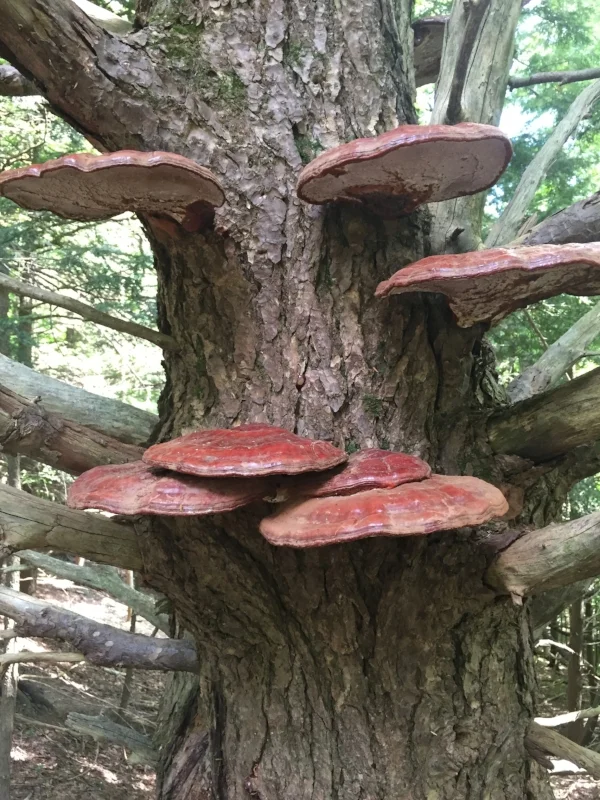Adaptogens and the Many Ways We Dance With Life
The term "adaptogen" is used widely in traditional western herbalism and, adaptogens themselves are important medicines to integrate into almost any herbal formula or used as simples. In fact, I believe that these herbal allies are an imperative component of modern life. Adaptogens refer to a variety of plants and fungi, and the word adaptogen indicates exactly what these herbs do; they help us to adapt. When searching for the etymology of the word adapt(one of my favorite pastimes), I found that its Latin roots are from ad-, to and aptare-, join; to join. Also, from the Latin apere meaning to attach or bind. These meanings indicate an adjustment between two things. The current use of the word is defined by the free online dictionary as: to adjust (someone or something, esp oneself) to different conditions, a new environment, etc and to fit, change, or modify to suit a new or different purpose. Because I prefer to view life and the world from a cooperative perspective, I have inferred from these definitions that the concept of adapting or adapation is an interaction that occurs when two forces form a relationship and, in order to do so, both must be flexible and mutable enough to remain vital,alive and sovereign in the circumstances they have created in this bonding process. I do not however, subscribe to the Darwinian interpretation of adapting which perceives nature as inherently competitive and, if a species has the capacity or genetic predisposition to adapt, they will out-survive those that do not. I know that this is one bent on the truth, but not the only lens with which nature can be viewed. My direct experience with the natural world has taught me that we adapt by being in communication either within ourselves, with each other, with other species or even with disease patterns. In this dialogue, we learn what is needed in order for the whole of life to evolve and remain creative and, by hearing the message of the other, we can understand what is necessary, pertinent and life serving. Yes, sometimes this requires sacrifice, perhaps discipline and some degree of surrender, but in this consensual symbiosis there may become a glorious dance.
When we think in terms of an herbal 'adaptogen' we are referring to something that will help us to adapt by increasing our ability either to resist or digest, integrate and eliminate what is detrimental, disease producing or not life enhancing either in our relationship with external or internal conditions. As modern people we are especially confronted with the need to adapt to our external environment which bombards us with pollution in many forms, and a culture that breeds isolation and disconnection increasing emotional and psychological stress. Simply defined, adaptogens help our bodies to adapt to all of the causes of stress including chronic illness, pollution, lack of nutrition, long-term drug use, anxiety and challenging life situations. Adaptogens have been formally defined by scientists as follows:
They are non-toxic and produce minimal side effects
Their activity is nonspecific showing an overall increased ability or power of the body to resist stress and to build "adaptive energy" by restoring our vital force and chi. When we are exposed to stress in all its forms, adaptogens help us to build and then call on these reserves in order for us to re-adjust and balance our systems and re-establish harmony within.
They have a normalizing influence meaning that they will modulate activity in whatever direction is necessary to obtain equilibrium either increasing or decreasing functioning
Overall, adaptogens build our resistance to outside and inside stress by normalizing our stress response and increasing the capacity of our cells and organ systems not only to conserve energy, but to differentiate when it is necessary to expend it. In other words, adaptogens increase the overall intelligence of our natural defense system so that resistance is only stimulated when necessary and appropriate, while at the same time, they provide the needed tonic nutrients that enable the energy required to maintain these defenses. When we bring these amazing adaptive forces into the conversation of our physiology and our already present life affirming processes we have an exquisite and articulate tool at hand. I don't use adaptogens the same way I would use say, Echinacea, where, if I have a sore throat or a cold coming, on I take a dropper or two and, boom, it's gone. I use these long term and often for either chronic or reoccurring issues such as allergies, lyme disease, multiple chemical sensitivities, auto-immune disease or for recovery from a cold, flu, surgery, etc. There is a caution, however when using adaptogens, that they be a part of an overall health and lifestyle protocol and that the root disease is addressed and that they not be used to merely cover up or avoid the deeper issue.
There are lots of adaptogens in use in herbal medicine but here are a few of my favorites. You will find that many of the plants that are considered adaptogens are not native to North America, although many can be grown here. This is the one place where, although I always prefer to use local plants, I feel that the benefits of these powerful herbs are worth stepping out of my bioregion for. Also, there are many other herbs that have adaptogenic qualities and are adaptogens, but also contain compounds that do not fit into the above definition.
Sacred Basil(tulsi)(Ocimum sanctum)- Sacred or Holy Basil is easily grown in the Northeast or other cold climates, but is native to India and is widely used in Ayurveda.I have written more in depth about this incredible plant here. I use Sacred Basil for a variety of conditions as it is not only adaptogenic but also antibacterial, antidepressant, anitviral, expectorant and an immunomodulator. I love it for the brain fog I get when I am experiencing my own Lyme disease related issues. I find it second to none in any condition where there is scatteredness of thinking either due to fatigue, depression or ADHD. Tulsi brings mental clarity without the stimulating side-effects of caffeine. I have also found it very helpful for anyone who has used marijuana for a long time and is either interested in stopping or has stopped but is still experiencing the lack of clarity and sense of stagnancy that can continue for even years after.
Sacred Basil sprouts in my garden
Reishi mushroom(Ganoderma Lucidum)- We use a species of Reishi in the Northeast called Ganoderma Tsugae and although I have read that it does not have as strong as an effect as some of the Chinese species, I have not had that experience. I have tried both the Tsugae and Lucidum personally and with others and find the Tsugae to be perhaps slightly less effective. The Reishi that grows here is found on dead Hemlock trees, but is not considered a 'true Reishi'. Regardless, it's what I have found to be incredibly adapative when given for inflammation, as an antioxidant, nervine, for general debility especially after and illness and as an immunomodulator. I have used it myself for years for allergies and Lyme disease and with many others for a variety of inflammatory conditions including psoriasis, excema and auto-immune conditions. I almost always use it with other herbs when someone has anxiety or panic disorder.
Ashwaganda(Withania somnifera)- this is another plant that is Native to India and is also called winter cherry. This is also a great adaptogen for nervousness as it is calming for people with anxiety and restoring for anyone with nervous exhaustion. I found this very helpful for my daughter who was exhausted and felt weak for months after she had major abdominal surgery and had difficulty finding the energy and strength she needed to get back into her school and sports routine.This is appropriate for anyone who has chronic muscle pain or weakness with or without arthritis.
American Ginseng(Panax quinquifolius)- The first thing that I want to say about American Ginseng is that it is highly endangered and it is not ethical to wildcraft. I only obtain American Ginseng from cultivated sources. This is one of our beloved native North American plants and was used widely by the First Nations. I have only discovered it rarely, although I have hiked and explored the woodlands of upstate New York extensively for years. It actually takes 7 years for this plant to grow into maturity which is partly why there is so little of it when most of it's habitat has been either destroyed or logged. It's a wonderful adaptogen especially for those with yin deficiency where there is dryness , adrenal burn-out, general debility and overall depletion. I like this for people who are elder/older and have either over-worked or over-played and now they're just dried up although it's appropriate in any case where there is a need to restore and strengthen.
Nettles(Urtica dioica)- Nettles is not commonly considered as an adaptogen, but I find to be so, especially to the endocrine system.and kidneys. It is generally nutritive, restorative and high in protein, vitamins and minerals and Matt Wood writes that it's tropho-restorative to the protein pathways reducing allergic reactions to proteins. Nettles is also known to regulate metabolism, the root is used to restore male reproductive function, and the seeds restorative to kidneys and adrenals. Nettles is blood building and detoxifying as it encourages healthy elimination. I could write an entire post about the amazing benefits of Nettles and most likely will, but for now will leave you with this quote from David Hoffman(as written in Matt Woods book) "When in doubt, give Nettles."
The warm winter has the Nettles poppin' up already!
Codonopsis(Codonopsis pilosula)- also known as Dang Shen and children's Ginseng, this is probably my most often adaptogen used with children. I put it in my winter syrup that I make for my family and it is probably in almost every children's formula that I make especially for children with asthma. It is great for anyone with asthma or any lung deficiency where there is weakness, fatigue and chronic colds. It's an excellent immune tonic and I like for anyone who's been on antibiotics to restore normal immune and digestive balance. Codonopsis dried roots also make great teething sticks as they are sweet and chewy while giving your child an immune boost. Codonopsis is native to China, but does grow in the Northeast.
There are many more adaptogens that I have not discussed and for more reading and an extensive list you can read David Winston's book Adaptogens. This book give a comprehensive look at the many adaptogens and all implications for their use. Again, keep in mind, with any herb or herbal protocol that the entire context of the any debility or disease pattern must be considered and that herbs are not a panacea for illness, but an important component of an overall healthy lifestyle.
May you walk in balance
~Lisa





